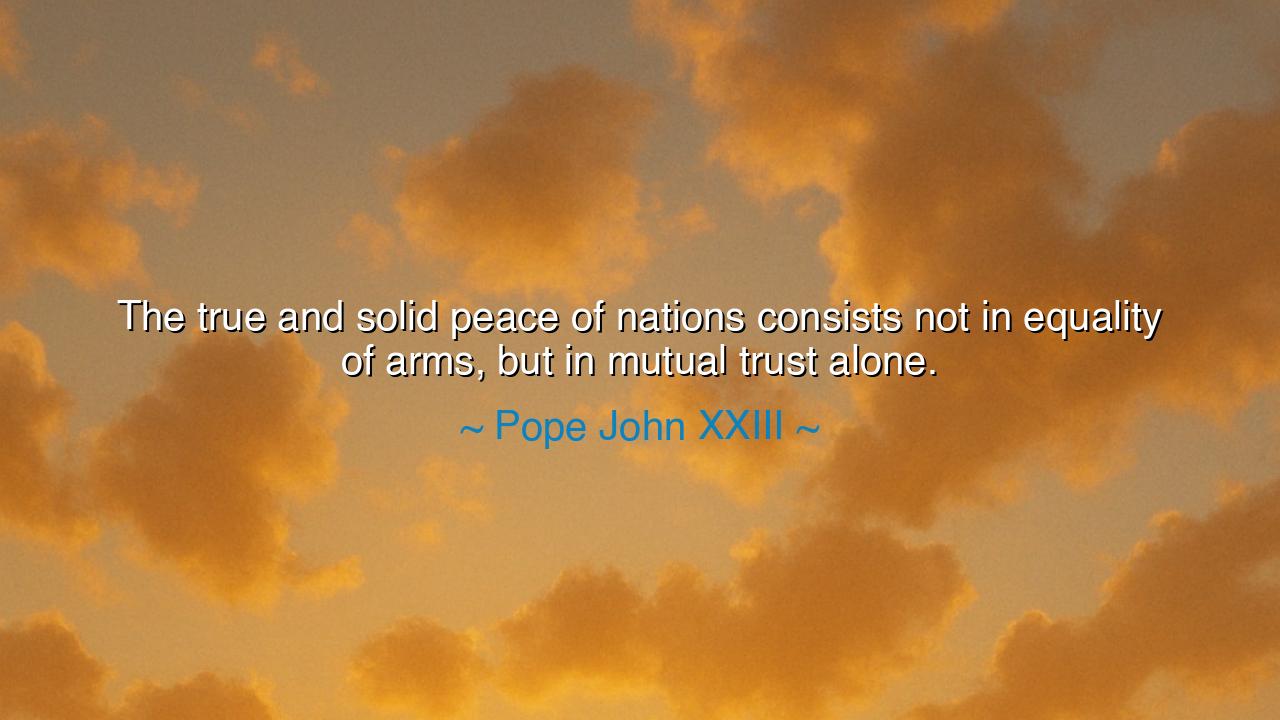
The true and solid peace of nations consists not in equality of
The true and solid peace of nations consists not in equality of arms, but in mutual trust alone.






"The true and solid peace of nations consists not in equality of arms, but in mutual trust alone." These profound words of Pope John XXIII speak to a fundamental truth about the nature of peace. True peace, he asserts, is not born from the balance of military strength or the equality of arms, as some might believe, but from the deeper, more spiritual foundation of mutual trust. In a world where nations often focus on strengthening their defenses, stockpiling weapons, and preparing for conflict, Pope John XXIII calls us to recognize that lasting peace can only emerge when nations learn to trust one another, to see the humanity in each other, and to build relationships based on shared understanding and respect.
In the ancient world, the wisdom of peace was not found in the accumulation of power but in the cultivation of trust between communities. Pericles, the great Athenian leader, understood that the strength of his city lay not only in its formidable walls or military might but in the trust of its citizens and the alliances it formed. He built a powerful democratic system in Athens by fostering a sense of shared purpose and mutual responsibility among his people. The true strength of Athens was in the bonds between its people and their confidence in their collective vision. In times of great turmoil, it was this trust that held the city together, enabling it to thrive despite external threats.
Similarly, in the story of the Roman Republic, the early republic was founded not only on the strength of its legions but on the mutual trust between its citizens and leaders. Cicero, one of Rome’s greatest orators and statesmen, spoke often of the social contract—the unspoken bond of trust between the leaders and the people. The republic’s success lay in the idea that its leaders acted in the interests of the people, and the people trusted their leaders to do so. When trust was broken, as it was in the late republic, with corruption and betrayals, the state itself began to crumble, and Rome descended into civil war. This demonstrates that peace between nations, much like within a republic, is only sustainable when trust is firmly established.
Pope John XXIII’s insight can also be seen in the context of the Cold War—an era where the world was divided by the fear of nuclear annihilation. The arms race between the United States and the Soviet Union created a tense and fragile peace, where both sides amassed ever-increasing stockpiles of destructive power in the name of maintaining peace. Yet, true peace was never achieved through this balance of terror. It was only in moments of dialogue, such as during the Cuban Missile Crisis, when trust—however fragile—began to take root between leaders like John F. Kennedy and Nikita Khrushchev, that the world began to see the possibility of real peace. The mutual trust that emerged, even in the most perilous moments, was a reminder that peace could not be imposed by weapons but must be nurtured through understanding and cooperation.
The lesson Pope John XXIII offers us is one of profound wisdom: true peace is not the absence of conflict, but the presence of trust. While weapons and armies may provide a temporary shield against aggression, they cannot bring about lasting peace. Only through mutual trust, where nations are willing to see each other not as adversaries but as partners in the shared destiny of humanity, can we hope to build a world free from war and suffering. This trust is not born overnight; it is a process, a gradual building of relationships, grounded in respect, dialogue, and the willingness to understand each other's fears and hopes.
In our personal lives, we can take a similar lesson. Trust is the foundation of every relationship, whether between nations or between individuals. When we foster trust, whether in our families, our workplaces, or our communities, we create environments where peace and cooperation can flourish. This requires not only honesty but also the ability to listen, to empathize, and to acknowledge the humanity of others, even when we disagree. It is easy to focus on the differences that divide us, but true strength lies in seeing beyond those differences to the common goals we share.
Let us, then, walk forward in the spirit of Pope John XXIII’s wisdom. In every aspect of life, let us seek to build trust—between nations, within our communities, and within our own hearts. For in that trust, we find the true foundation of peace, the solid ground on which we can build a world that honors the dignity of every person, that seeks understanding over conflict, and that embraces cooperation over division. The future of humanity depends not on the equality of arms but on the depth of our shared trust, for it is this that will guide us to a brighter, more peaceful tomorrow.






AAdministratorAdministrator
Welcome, honored guests. Please leave a comment, we will respond soon